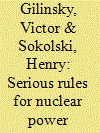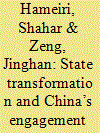| Srl | Item |
| 1 |
ID:
127638


|
|
|
|
|
| Publication |
2014.
|
| Summary/Abstract |
The authors propose five principles for addressing the major deficiencies of the current treaty-based approach to nonproliferation. These involve: effectively closing the door to withdrawals from the Treaty on the Non-Proliferation of Nuclear Weapons (NPT); defining which nuclear technologies fall within the NPT's "inalienable right" provision, so as to maintain a reasonable safety margin against possible military application; expansion of International Atomic Energy Agency inspections to include greater readiness to use its "special" inspection authority; creation of an NPT enforcement regime, to include a secretariat; and universalizing the NPT so as to apply to all states, while creating a path for current non-parties to come into compliance. There is no illusion here about the prospects for the adoption of this approach. At a minimum, the world needs to be frank about the gap between nuclear programs and current nonproliferation protection. Encouragement of greater use of nuclear power should be predicated on closing that gap.
|
|
|
|
|
|
|
|
|
|
|
|
|
|
|
|
| 2 |
ID:
175061


|
|
|
|
|
| Summary/Abstract |
Debates over the implications of China’s rise for global governance have reached an impasse, since evidence exists to support both ‘revisionist’ and ‘status-quo’ intentions. This means that neither is strictly falsifiable and hence the debate, as currently structured, is irresolvable. However, contradictions are explicable if we recognise that China is not a unitary state. Since the beginning of the reform era, its international engagements have been shaped by the uneven transformation – fragmentation, decentralisation and internationalisation – of state apparatuses. Contradictory international actions thus may reflect not top-down strategic direction, but conflicts, disagreements and coordination problems within China’s transformed party-state. Our state transformation approach directs us away from evaluating China’s approach to global governance in toto – whether it is overall a revisionist or status quo power – towards a detailed analysis of particular policy domains. This is because in each issue-area we find different constellations of actors and interests, and varying degrees of party-state transformation. We demonstrate the centrality of state transformation analysis for explaining the co-existence of revisionist and status quo behaviours through the apparently hard test case of nuclear technologies. Even in this ‘high politics’ domain, state transformation dynamics help explain China’s inconsistent international behaviours.
|
|
|
|
|
|
|
|
|
|
|
|
|
|
|
|
| 3 |
ID:
132716


|
|
|
|
|
| Publication |
2014.
|
| Summary/Abstract |
Amidst the Ukrainian crisis several statements were made in Kiev that Ukraine should develop nuclear weapons of its own. Although the probability is not high, this issue prompts an analysis of Ukraine's real nuclear potential in this sphere.
The Ukrainian political crisis of 2013-2014 brought to a head a discussion that had been going on before about Ukraine's nuclear status. Several statements were made in Kiev that Ukraine should develop nuclear weapons of its own. Advocates of this idea pleaded the non-fulfillment of the Budapest Memorandum of 1994 in which three nuclear powers - the United States, Britain and Russia - had provided security guarantees to Kiev in exchange for a waiver of the Soviet-era nuclear arsenal. In February-March 2014, statements to this effect were made, among others, by ex-foreign minister of Ukraine Volodymyr Ohryzko, Verkhovna Rada deputy Mykhailo Holovko of the All-Ukrainian Union Svoboda, and Verkhovna Rada deputy Oleh Lyashko, leader of the Radical Party of Ukraine. On March 1, 2014, this issue was discussed by the National Security and Defense Council of Ukraine
|
|
|
|
|
|
|
|
|
|
|
|
|
|
|
|